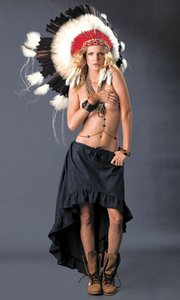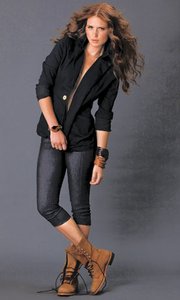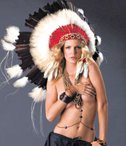Chip Foster Launches Pray for Mother Nature
The indefatigable Chip Foster—one-half of the twin-brother duo who created the Chip and Pepper line of premium denim—has launched Pray for Mother Nature, a new denim-centric collection that is made in Los Angeles.
Packed with denim in fashion silhouettes, T-shirts, dresses, knit cardigans and sweat shirts, Pray for Mother Nature soft-launched for Fall 2010 with limited distribution and wholesale prices of $72 to $95. Key styles include denim leggings, skinny cargo pants, lightweight wide-leg trousers and drop-crotch jeans.
“We are 100 percent made in America,” Foster said. “That means we’re not a lower-priced line because producing in the U.S. is just more expensive. But we’ve been very pleased with the reaction to the line.” Pray for Mother Nature initially debuted in select specialty stores such as Planet Blue and Madison. Spring 2011 will see the line’s distribution grow to more than 27 specialty retailers.
Pray for Mother Nature is special, Foster said, because of the brand’s innovative design process and sexy silhouettes. For the Spring 2011 collection, the brand will debut three new denim fabrications developed especially for the line. “No one else has this denim. It’s a deep indigo with great washes,” he said. Overall design for the line is clean, he said, with clean tack buttons and no logos or rivets.
Domestic manufacturing is not new to Foster, who has produced much of Chip & Pepper’s denim in the United States, but that doesn’t make it an easy proposition. “It’s tough out there,” he said. “A lot of premium denim is produced overseas, and consumers don’t really seem to care if there’s a ’made in America’ tag on their jean. Consumers in Europe and Japan care and will pay the price, but what American [consumers] care about is price.”
Still, domestic production has definite advantages. Offshore manufacturers can’t compete with a quick turnaround on orders. “We can bang out goods in three weeks if we need to. Overseas factories would need a four- to five-month lead time for the same order,” Foster said. And producing domestically lets him keep his hands and eyes on the whole process, resulting in fewer mistakes. Plus, specialty retailers, he added, know that jeans made in Los Angeles come with a steeper price point and won’t flinch at the added cost if the line is special enough to justify the expense.
Despite the challenges associated with producing domestically, Foster said he is committed to it. “We’re an American brand; we want to keep making in America,” he said. “And we’re looking to grow.” Licensing categories such as shoes, handbags and other accessories with domestic manufacturers will be a key focus going forward. For more information, call (310) 450-2460.—Erin Barajas
























